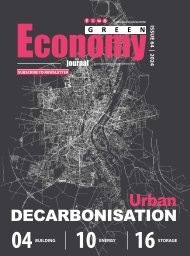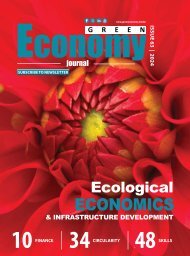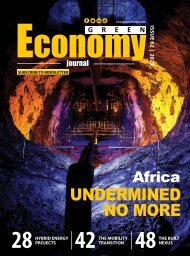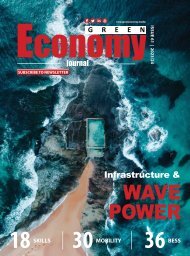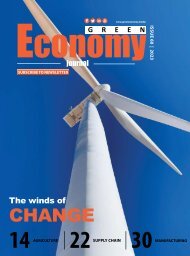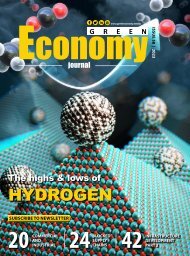Create successful ePaper yourself
Turn your PDF publications into a flip-book with our unique Google optimized e-Paper software.
WASTE<br />
WASTE<br />
Waste management<br />
is key to a<br />
HEALTHY ENVIRONMENT<br />
Inadequate waste management poses a significant threat to the environment, polluting the<br />
soil and ground water and undermining ecosystem functions and services.<br />
BY THE DEPARTMENT OF FORESTRY, FISHERIES AND THE ENVIRONMENT<br />
Marine plastic waste is a global problem that threatens<br />
biodiversity and wildlife, and originates mostly on land from<br />
single-use plastics. When these products and packaging are<br />
not properly disposed of, they leak into the environment.<br />
The 2018 State of Waste report estimates that of the 55.6-million<br />
tons of general waste that was generated in South Africa, 19 247 851<br />
tons was organic waste and 65.2% was landfilled. To improve waste<br />
management in South Africa, government is working to progressively<br />
increase the number of households with access to weekly waste<br />
collection; improve landfill compliance and is looking to the future<br />
of waste disposal beyond landfilling. In this regard the reduction and<br />
recycling of waste plays an important role.<br />
Government aims to have 40% of waste diverted from landfill within<br />
five years through reuse, recycling, recovery and alternative waste<br />
treatment. The aim is to reduce the current amount of waste by about<br />
25% over the same period and ensure a further 20% of waste is reused<br />
in the economic value chain.<br />
The year 2022 was a vital year in the implementation of the<br />
Extended Producer Responsibility schemes for packaging products,<br />
eWaste and the lighting sectors, and the Department hopes to<br />
extend these schemes for batteries, pesticides and lubricant oils in<br />
the near future.<br />
Regulations for organic waste treatment, as well as the composting<br />
of organic waste, were published in 2022 for implementation. This will<br />
help ensure that organic waste, including food waste, is diverted from<br />
landfills and used in composting and other sustainable technologies<br />
South Africa joined member states of the United Nations Environment<br />
Assembly in affirming its commitment to curb plastic pollution. But<br />
this means that the Department needs to ensure that the transition<br />
for plastic packaging is phased, and that the circumstances of the<br />
domestic plastic industry are addressed. This includes the close<br />
linkages with the food industry.<br />
The 2020 National Waste Management Strategy identified food<br />
waste and loss as a critical area that requires intervention. Thus,<br />
the development of a Draft Food Loss and Waste Strategy which,<br />
amongst others, aims to increase awareness on the impact of food<br />
waste, align with chemicals and waste economy initiatives, strongly<br />
integrate different disciplinary perspectives and best practices and<br />
map out the determinants of food waste generation to deepen the<br />
understanding of household practices and help design food waste<br />
prevention strategies.<br />
Food and beverage waste also has a significant impact on the<br />
environment due to methane gas which contributes to greenhouse<br />
gas (GHG) emissions produced when food spoils. Food production is<br />
resource intensive, while resources such as water, labour and energy<br />
are wasted, and biodiversity is impacted upon negatively.<br />
Waste management extends beyond industry and civil society. It is<br />
about individuals, households and those who earn a living through<br />
waste collection and recycling. There are between 60 000 and 90 000<br />
informal waste reclaimers working at the heart of South Africa’s<br />
recycling economy, recovering mostly paper and packaging waste<br />
from households and businesses.<br />
Data published by the packaging sector prior to the Extended<br />
Producer Responsibility regulations came into effect, estimates that<br />
waste reclaimers collect 80% to 90% of post-consumer paper and<br />
packaging for recycling. Government, industry and civil society<br />
recognise the important role waste reclaimers play in the diversion<br />
of valuable resources away from landfill and they promote the need<br />
to formalise and protect these livelihoods and the circular economy.<br />
Waste reclaimers are also a critical link between households and<br />
recycling enterprises.<br />
Although South Africa has made significant strides in improving<br />
waste management since 1994, almost a third of households still do<br />
not have regular weekly household waste removal services.<br />
To achieve the goals of the National Waste Management Strategy,<br />
national and provincial government must support municipalities to<br />
develop local integrated waste management strategies.<br />
The investment in yellow fleet (landfill management vehicles)<br />
to municipalities is an important part of the effort. The Department<br />
has, therefore, co-operated with National Treasury and the<br />
Department of Cooperative Governance and Traditional Affairs<br />
(CoGTA) to change the Municipal Infrastructure Grant Policy so<br />
that municipalities can access this grant to fund their yellow fleet.<br />
In addition, the Department spent R42.4-million in the past financial<br />
year to provide 22 vehicles to 19 municipalities across the country.<br />
The vehicles include skip loader trucks, front-end loaders, compactor<br />
trucks and other trucks required to transport waste within these areas.<br />
Communities must begin to separate their waste at home so that<br />
waste reclaimers can undertake their work in a dignified manner.<br />
Households must teach family members not to litter and must work<br />
with their neighbours to prevent illegal dumpsites. All of us must<br />
participate in regular clean-up campaigns to beautify our communities<br />
and protect our environment.<br />
Government aims to have 40% of<br />
waste diverted from landfill within five<br />
years through reuse, recycling, recovery<br />
and alternative waste treatment.<br />
54<br />
55




